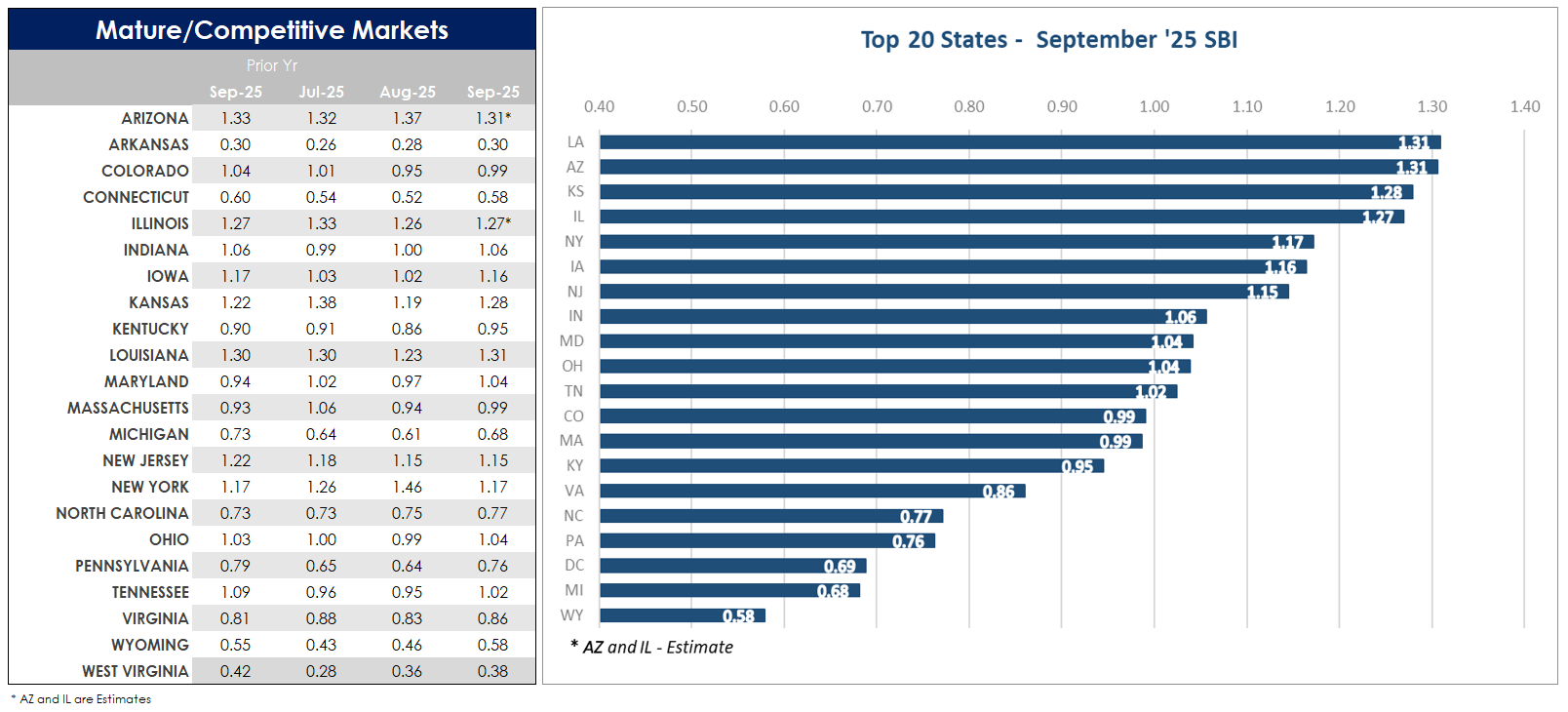RubinBrown Sports Betting Index: September 2025 Analysis
RubinBrown Sports Betting Index: September 2025 Analysis
September 2025 Sports Betting Index (SBI)
In the chart below, we present our RubinBrown Sports Betting Index (SBI). The SBI is based on our proprietary index of the leading sports betting states in the U.S. To continue to best reflect current market conditions, we’ll occasionally adjust the components of the index. To better compare competitive conditions, our index numbers focus in on a group of mature, competitive states. Therefore, a state with an index score of 1.15 had a raw index score of 15% greater than the average, while a 0.90 index score shows a 10% lower than average result.
LEARN MORE ABOUT THE RUBINBROWN SBI
Despite continued mounting competition from gray and black market operators, the licensed U.S. sports betting industry continues to expand, posting a 10.5% year-over-year handle increase in September. Twenty states recorded double-digit growth as the NFL season hit full stride. Even amid economic pressures and shifting media dynamics, this sustained momentum reflects strong consumer confidence in regulated platforms and underscores the long-term resilience of the legal market.
In spite of perceived headwinds, the future still looks bright for the legal, licensed, and regulated U.S. sports betting ecosystem.

U.S. Sports Betting Integrity: Functioning as Designed
The recent NBA/Poker betting investigation has reignited discussion around integrity in American sports. While any misuse of inside information is concerning, it’s fundamentally a league integrity issue. Sportsbooks can’t control the actions of a few bad actors; they detect and report them through established monitoring systems.
As with most financial crimes, bad actors sought methods in which they could obscure their actions, putting bets through seemingly less-watched channels such as betting kiosks where wagers don’t require identification. However, the tools and monitoring systems overseeing the regulated sports betting industry functioned properly and spotted issues despite efforts to have them pass undetected.
It was the policies, procedures, and transparency requirements of the licensed U.S. sports betting framework that brought this matter to light. The issue was quickly identified through real-time monitoring and advanced analytics, escalated via official league and integrity partners (e.g., Sportradar, U.S. Integrity, Genius Sports, IBIA). These incidents were publicly addressed, demonstrating a level of accountability and responsiveness rarely seen in unregulated markets.
Together, these mechanisms form an ecosystem where statistical anomalies can be flagged and investigated. The sports leagues/governing bodies are working with these investigators to help ensure match integrity is maintained and that informational leaks are minimized. Regulators rely on this interaction, as well as to adherence to existing regulations by licensed operators, to give bettors greater confidence that wagers are resolved fairly, transparently, and reliably. These aspects of a well-regulated and monitored sports betting industry should be lauded and presented as not only best practices, but as effective deterrents for those trying to fix outcomes or gain from the disclosure of inside information.
Global Context: Investigations and Regional Differences
Coupled with the high media scrutiny and severe penalties for violations, this system makes bet fixing extremely rare. According to Sportradar Integrity Services’ 2024 report, roughly 850,000 sporting events across 70 sports were monitored worldwide, and 1,108 suspicious matches were flagged globally, reflecting an overall incidence rate of approximately 0.13%. North America accounted for only 43 suspicious matches, or ≈0.005% of the global total.
These exceptionally low figures highlight the effectiveness of the U.S. regulatory framework, where licensed sportsbooks, operator level data, and league collaboration make manipulation difficult to execute without detection. Further, its worth remembering that all interests are aligned. Sportsbooks, leagues, regulators, and the betting public all want fair and competitive activities to occur on the playing field. No one wins from fixed or altered outcomes, or the perception of such, except for the few bad actors.
U.S. Trends and Reporting
While betting related investigations in the U.S. have increased over the past two years, this reflects greater reporting volume, not necessarily more misconduct. As legal markets mature, more operators, leagues, and state agencies contribute to integrity data, increasing transparency and early detection.
Recent cases, including investigations involving MLB, NFL, and NBA, show that suspicious activity is often first detected within the regulated system, underscoring the proactive role of sportsbooks and integrity partners. The NFL and NCAA football experienced isolated betting related incidents, but those appeared to involve policy violations rather than game manipulation, as certain athletes violated rules on participation in certain forms of sports betting. There was no evidence of integrity issues in their performances.
In short, while no system is entirely immune to risk, U.S. sports betting integrity continues to function largely as designed, focused on detection, reporting, and accountability. While the recent events were troubling as they leaked into the wider realm of public attention, they also brought with it an opportunity to highlight all the efforts undertaken to protect integrity and trust in our sporting events. This foundation of trust has helped sustain growth across the sports gaming sector, as reflected in the recent performance of our index. Simply put, confidence drives participation and investment.
For operators, investors, and regulators alike, market integrity is the cornerstone of long-term success in regulated sports betting. RubinBrown’s Risk Advisory Practice helps protect that foundation—partnering with clients to design and implement effective controls, deliver actionable insights into the evolving risk and integrity landscape, and strengthen compliance through continuous assessment and improvement. Connect with our team today to ensure your organization stays ahead of emerging risks and leads with integrity in a rapidly changing market.

Published: 11/11/2025
Readers should not act upon information presented without individual professional consultation.
Any federal tax advice contained in this communication (including any attachments): (i) is intended for your use only; (ii) is based on the accuracy and completeness of the facts you have provided us; and (iii) may not be relied upon to avoid penalties.